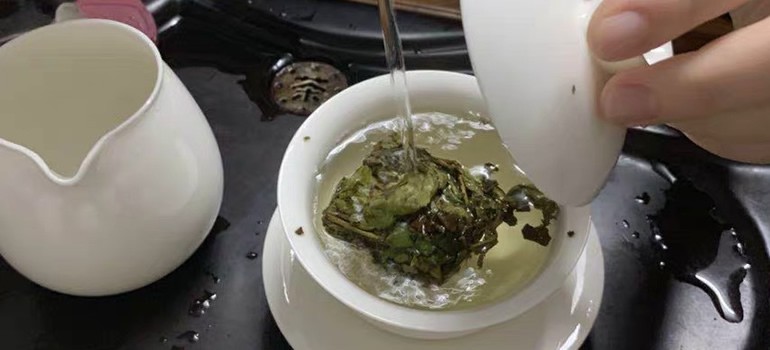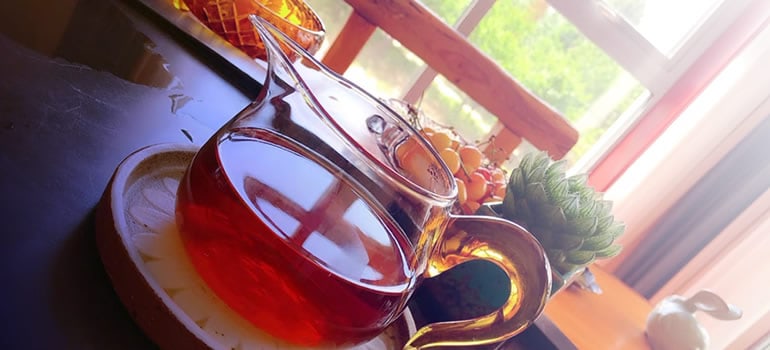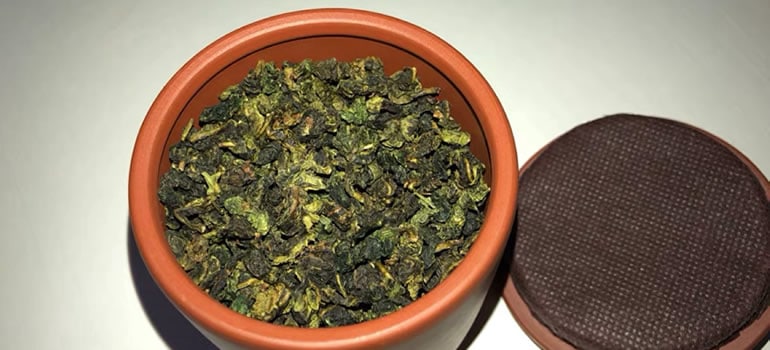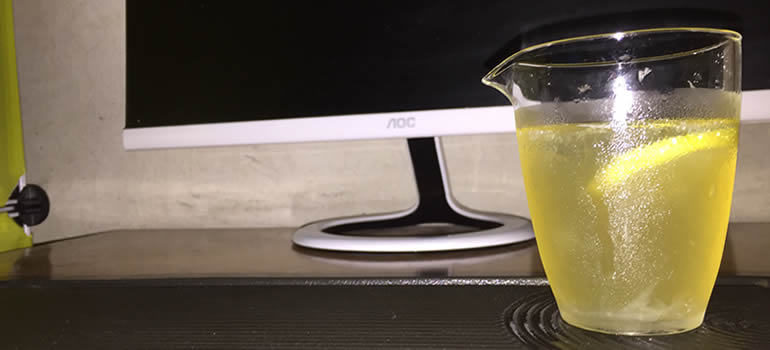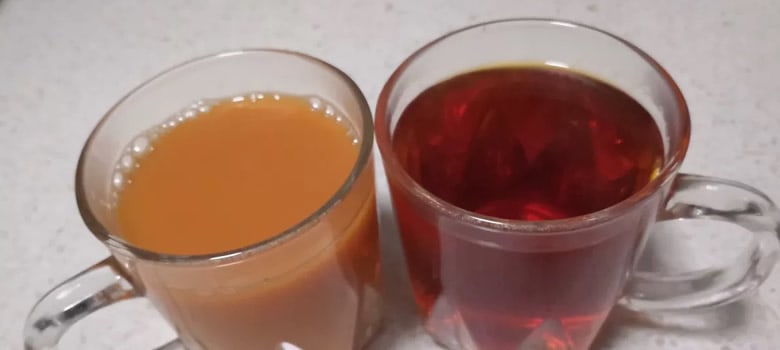
With so many different tea varieties, it is not very difficult to end up with more teas on your hands than you can handle.
I have been drinking tea for years, and still, to this day, I have the occasional situation where I buy too many different types of tea.
When this happens, usually I start mixing teas, but is this a good idea? I decided to research this topic.
Can you mix teas together? Yes, you can mix different teas together. Mixing teas can create a lot of new subtle flavors and aromas. However, not all teas can be mixed together because their flavors may not complement each other well. Also, certain teas should be brewed at different temperatures and steeped for a different amount of time.
There are some caveats here, though.
In this article, I go into more detail about everything you need to know before you start mixing your teas. If you are curious to find out more, read on.
What Happens When You Mix Teas?
Mixing teas is not something new. In fact, many people have been doing it for hundreds of years.
Anyone can mix two, three, or even more teas. That way you can bring out and create a variety of different and new flavors, aromas, and notes.
Mixing tea is a great way to bring more life and flavor to an otherwise boring cup of tea. Experimentation with tea is the key and is often recommended.
What Are the Different Ways People Mix Tea?
The easiest and most straightforward way to mix tea is by brewing and steeping two or more types of tea together.
You can easily mix two different types of loose leaf tea and steep them or simply place two (or more) different tea bags in your cup.
One time when I caught a cold, I remember I opened the cupboard and without even giving it much of a though mixed echinacea, linden, and ginger in one cup.
Alternatively, you can brew two different teas separately and later mix them in a single cup.
Tea is like the wine in that it has its own experts and sommeliers.
In fact, there is a thing called Tea mixology. Tea mixology means creating beverages (cocktails and mocktails) with tea.
Tea mixology requires a deeper understanding of not just how the different juices, alcohols, etc. mix but also understanding the subtle aspects and uniqueness of the different types of tea.
Tea blending is another instance where different teas are mixed together to produce a new product with superior flavor and aroma.
The difference here is that the producers do the tea blending before the tea is ready to sell. The majority of tea blends use black tea for a base to which other teas, spices, flavorings, or essential oils are added.
Is It Bad to Mix Tea?
Mixing teas together is not necessarily bad, health-wise, but there can be certain negative results of it.
First, let us take a look at some of the most widely used types of tea.
Tea is consumed not just for its health benefits but also for its flavor qualities.
People drink tea because they enjoy it.
Because of that, you will find out that there are very detailed preparation instructions for each tea.
| Tea Variety | Brewing Time (in min) | Brewing Temperature (in F) |
| White tea | 1 – 5 | 150 – 170 |
| Yellow tea | 1 – 3 | 165 – 175 |
| Green tea | 1 – 3 | 170 – 180 |
| Oolong tea | 1 – 3 | 170 – 185 |
| Pu-erh | 2 -5 | 170 – 180 |
| Black tea | 3 – 5 | 195 – 212 |
| Rooibos tea | 5 – 6 | 195 – 212 |
| Herbal tea | 4 – 7 | 195 – 212 |
These brewing temperatures and time can vary a lot depending on the variety of tea you have. Even two black teas brewed and steep the same way may end up with different strengths and flavor-qualities.
However, these are the general guidelines that will typically grant you the best result in terms of flavor and aroma.
The general rule of thumb is that about 1 to 2 grams of loose leaf tea is used per standard 8 oz cup of water.
But let us not forget that the quantity of tea which should be used can also vary. Black tea, for example, is usually used in smaller amounts compared to green or white tea.
So some of the problems that we are going to encounter here are in terms of brewing time and brewing temperature compatibility between the different varieties of tea.
Does Mixing Teas Affect Their Flavor?
If you mix two teas that have to be brewed at different temperatures and for a different amount of time, you will not achieve the optimal flavor for at least one of the teas used. And sometimes the taste of both teas will be ruined.
If you try to play around the bitterness and avoid it, then one of the teas may end up bland-tasting as it either did not have enough time to properly steep or the temperature was too low for it to release any flavors.
Does Mixing Teas Affect Their Health Benefits?
We all know that drinking tea has numerous health benefits.
These benefits are due to the high antioxidant content of tea.
The brewing time and temperature can affect the overall antioxidant content in your cup of tea.
If you do not steep your tea long enough or at high enough temperature, the polyphenols and phytochemicals will not be infused with the water. Granted, you may still have some of them in the water, but it will be far from the optimal amount.
On the other hand, exposing these chemicals to extremely high temperatures can also lead to them breaking down faster.
Frequently you can end up with bitter or bland tasting tea.
Does Mixing Teas Have Adverse Health Effects?
Generally speaking, there aren’t any recorded adverse effects from mixing teas.
Conversely, one of the problems that certain people may encounter is in connection to the caffeine content.
For example, mixing black tea with mate tea, matcha tea, or oolong tea can result in a teacup that has as much caffeine, if not more, as coffee has.
Excessive caffeine consumption can lead to difficulty sleeping, irritability, nervousness, jitteriness, anxiety, agitation, and more.
High caffeine drinks are not recommended for:
- Young kids and teenagers;
- Pregnant people;
- People who have difficulty sleeping or suffer from anxiety; and
- People with arrhythmia.
Overall the dangers of tea consumption come into play when teas are consumed in large quantities. For example, drinking more than five cups of black tea per day can be considered unsafe.
Can You Mix Green Tea With Other Teas?
You can mix green tea with other teas. The subtle floral notes and flavors of green tea go well with a wide variety of other true teas and tisanes.
Can You Mix White and Green Tea?
White tea and green tea can be mixed together. The brewing temperature and time of green tea and white tea are close enough to allow them to be mixed together.
In one study, the antioxidant content of green tea was found to be both time and temperature-dependent. The best antioxidant content was found in green tea that was steeped in cold water for a longer time (two hours).
Can You Mix Green Tea and Chamomile Tea Together?
Yes. You can mix green tea and chamomile tea. The two teas mixed together have a unique taste. The green tea has a more vegetal and nutty flavor with slight bittersweet notes while chamomile tea adds a very distinct earthy and full-bodied taste that cannot be mistaken.
Make sure to get a real chamomile tea as from experience, I have found out that tea bags do not come even remotely close to what the real chamomile tea tastes like.
Adding green tea is one of the best ways to make chamomile tea taste better and add some complexity to it.
Can You Mix Green Tea and Black Tea?
Although green tea and black tea come from the same plant, their flavors do not combine and complement each other very well.
Black tea is stronger, darker, and with a more acidic taste, while green tea is more delicate, grassy, and nutty.
Green tea and black tea are best enjoyed separately.
Can You Mix Green Tea and Oolong Tea?
You can mix green tea with oolong tea; however, you will have mixed results. The problem is that oolong tea can vary significantly in terms of its flavor and taste qualities because it undergoes different processing techniques.
The taste of oolong tea varies between grassy to floral and from full-bodied to very light-bodies.
Can You Mix Green Tea and Mint Tea?
Green tea should be mixed with spearmint tea. People sometimes use peppermint, which is a lot stronger and kind of overtakes the whole cup of tea, which can result in a very unpleasant tea mix.
Due to the different taste-qualities of mint tea and green tea, this is one of these tea mixtures that people either love or hate.
Can You Mix Black Tea With Other Teas?
Black tea is the most widely consumed tea in the world. So, naturally, it can be found in many different tea blends like Earl Gray, Irish breakfast, English breakfast, Masala Chai, and so much more.
Can You Mix Black Tea and Herbal Tea?
If we take another look at the table, we will find out that both black tea and herbal teas have similar brewing temperature, which is between 195 to 212 degrees F.
So far, so good. However, the problem is that black tea should be brewed for 3 to 5 minutes while herbal teas are typically brewed for 4 to 7.
And certain herbal teas can be steeped for 15 to 60 minutes.
If you leave your black tea brewing or steeping for so long, you will end up burning it. Also, the more time you are steeping your black tea for the more caffeine content, there will be in your cuppa. In any case, the chances are you will end up with one very bitter-tasting cup of tea.
And one study has discovered that the longer you steep black tea, the less antioxidant content there will be.
So if you want to mix black tea with certain herbal tea, you should opt for brewing and steeping it following the preparation instructions for the black tea.
Can You Mix Black Tea and Pu-Erh Tea?
This is one of the tea blends that can frequently be found in shops.
Black and Pu-erh tea have steeping time and brewing temperatures that are very similar. This allows them to be combined together quite successfully.
Can You Drink Different Herbal Teas in a Day?
Herbal teas, which are also known as tisanes, fall into a different tea category. These are not prepared from the leaves of the Camellia sinensis and thus are not considered true teas.
Herbal teas are very popular, and people like them because the herbs provide different health benefits.
but that begs the question, “Can you mix herbs together for tea?”
You can mix herbal teas (and herbs) together and drink them. There is nothing inherently bad about mixing herbal teas. Herbal teas are made from the flower, plant, or the root of the herbs. They are no dangerous if consumed in moderate levels.
Consuming too much herbal tea can indeed do more harm than good and should be avoided.
How to Mix Different Teas Together?
I do appreciate and enjoy the complexity of some teas, but I also enjoy mixing different varieties of tea.
I have been doing it for many years, more than I care to remember.
Above, we have explored the potential dangers and adverse effects of mixing teas. But let’s see if we can do something about this and what are the best ways to mix teas.
Focus on the More Delicate Tea in the Mix
Preparing tea should not be a project that requires extensive planning.
Tea should not be a chore.
So this is why I wanted to start with the best and easiest way to mix and prepare different teas.
What I have found is that it is best to focus on the more delicate tea in the mix. Brew and steep your tea mixture according to it.
Let me give you a couple of examples:
- Mixing white and black tea; brew and steep for the white tea.
- Mixing green and black tea; brew and steep for the green tea.
- Mixing herbal and black tea; brew and steep for the black tea.
That way, you will bring out the flavor of the more delicate tea while adding a decent amount of flavor and notes from the other tea in the mix, without its flavor overtaking the taste.
Combine Teas With the Right Brewing Time and Temperature
So far, you have learned that the different teas brew and steep at different temperatures. This is why it is best to combine different teas that fall into the same category temperature and steeping-wise.
On the low end, we have white and yellow teas that are brewed and steeped similarly.
Green tea, oolong and pu-erh, are somewhere in the middle.
While Black, rooibos, and herbal teas are brewed at higher temperatures.
Rooibos is very versatile, and it can be used effectively with lighter or stronger teas.
On the other hand, you can mix a tea that brews at higher temperatures for a longer time with a tea that brews for less time at lower temperatures by simply adding the latter later.
An excellent example of that would be mint tea with green tea. Which is a popular tea mix in Asia.
Combine the Right Flavors and Accents
With tea, it is all about achieving the right flavor.
Of course, this takes time to master, and experimentation is more than recommended. Today I can perfectly mix certain types of tea and use the right quantities of each tea depending on what kind of flavor I want to achieve.
The ratios can vary according to your personal tastes and preferences. It can be a 50/50 split between two teas, or 60/40, and even 70/30. Or why not also mix multiple teas?
I would invite you to write down how much and what kind of tea you have used each time. That way, you can keep track and fine-tune your tea mixture.
Brew Each Tea Separately
Another way to combine two different teas that should not be typically brewed at the same time is to prepare them separately.
For example, if you like the taste of black tea and want to combine it with white tea, you can brew them separately and just mix them together once they are ready.
Resources:
https://www.thespruceeats.com/brewing-white-tea-694331
https://www.stashtea.com/blogs/education/how-to-brew-tea
https://www.twinings.co.uk/about-twinings/latest-news-and-articles/how-to-make-tea-perfectly
https://www.sciencedaily.com/releases/2015/12/151216120154.htm
https://webcache.googleusercontent.com/search?q=cache:cv-oFSskR9kJ:https://blog.artoftea.com/2016/07/13/should-you-mix-teas-together/
https://www.teamuse.com/article_181025.html
https://www.medicalnewstoday.com/articles/271707.php
https://www.studiomefitness.com/blog/2017/09/coffee-drink-avoid
https://www.stashtea.com/blogs/education/how-to-brew-tea
https://www.dilmahtea.com/tea-inspirations/tea-maker-mixologist.html
https://steepster.com/discuss/3068-is-it-bad-to-mix-different-brands-of-tea#
https://answers.yahoo.com/question/index?qid=20110202083447AAjSfxu
https://en.wikipedia.org/wiki/Tea_blending_and_additives
https://steepster.com/discuss/2170-mixing-teas
https://www.livestrong.com/article/524739-can-you-drink-different-herbal-teas-in-a-day/
https://www.webmd.com/vitamins/ai/ingredientmono-997/black-tea

